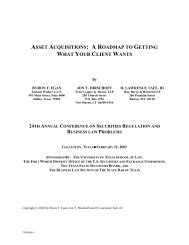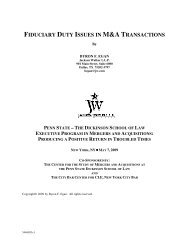busted m&a deals headed for litigation - Jackson Walker LLP
busted m&a deals headed for litigation - Jackson Walker LLP
busted m&a deals headed for litigation - Jackson Walker LLP
Create successful ePaper yourself
Turn your PDF publications into a flip-book with our unique Google optimized e-Paper software.
imposed upon findings of (1) continuity of the outward appearance of the enterprise, its management<br />
personnel, physical plant, assets and general business operations; (2) the prompt dissolution of the<br />
predecessor following the transfer of assets; and (3) the assumption of those liabilities and<br />
obligations necessary to the uninterrupted continuation of normal business operations. These are<br />
essentially the same ingredients which support the de facto merger doctrine - but without the<br />
necessity of showing continuity of shareholder ownership.<br />
3. Product Line Exception<br />
In 1977 Cali<strong>for</strong>nia took a slightly different tack in holding a successor liable in a products<br />
liability case. In Ray v. Alad Corp., 560 P.2d 3 (Cal. 1977), the buyer had acquired essentially all of<br />
the seller’s assets including plant, equipment, inventories, trade name, goodwill, etc. and had also<br />
employed all of its factory personnel. The buyer continued to manufacture the same line of products<br />
under the seller’s name and generally continued the seller’s business as be<strong>for</strong>e. Successor liability<br />
was found by the Cali<strong>for</strong>nia Supreme Court:<br />
A party which acquires a manufacturing business and continues the output of its line<br />
of products under the circumstances here presented assumes strict tort liability <strong>for</strong><br />
defects in units of the same product line previously manufactured and distributed by<br />
the entity from which the business was acquired.<br />
The rationale <strong>for</strong> this doctrine had moved a long way from the corporate statutory merger analysis of<br />
the de facto merger doctrine. The Court determined that the plaintiff had no remedy against the<br />
original manufacturer by reason of the successor’s acquisition of the business and consequent ability<br />
of the successor to assume the original manufacturer’s risk. The Court also determined that the<br />
responsibility of the successor to assume the risk <strong>for</strong> previously manufactured product was<br />
essentially the price which the buyer had paid <strong>for</strong> the seller’s goodwill and the buyer’s ability to<br />
enjoy the fruits of that goodwill. See also Ramirez v. Amsted Industries, Inc., 431 A.2d 811 (N.J.<br />
1981).<br />
4. Choice of Law<br />
Of those states which have considered the issues directly, more have rejected the product line<br />
exception than have embraced it. However, because choice of law principles, especially in the area<br />
of product liability, may find the law of a state in which an injury occurs to be applicable, the reach<br />
of those states which have embraced either the product line exception or the narrower continuity of<br />
interest doctrine may be beyond their respective borders. See generally Ruiz v. Blentech<br />
Corporation, 89 F.3d 320 (7 th Cir. 1996); Nelson v. Tiffany Industries, 778 F.2d 533 (9 th Cir. 1985).<br />
5. Environmental Statutes<br />
In 1980 the federal Superfund law was enacted - Comprehensive Environmental Response,<br />
Compensation and Liability Act of 1980 (“CERCLA”). In the years since the enactment of that<br />
statute, environmental issues have become a central - and often dominant - feature of acquisitions.<br />
Moreover, in creating liability of a current owner <strong>for</strong> the costs of cleaning up contamination caused<br />
by a prior owner, the statute effectively preempted the ability of a buyer to refuse to accept liability<br />
<strong>for</strong> the sins of the seller or seller’s predecessor. Unlike the theories discussed above which might<br />
impose successor liability on a buyer if certain facts appeal to certain courts, CERCLA determined<br />
4032470v.1<br />
- 15 -

















